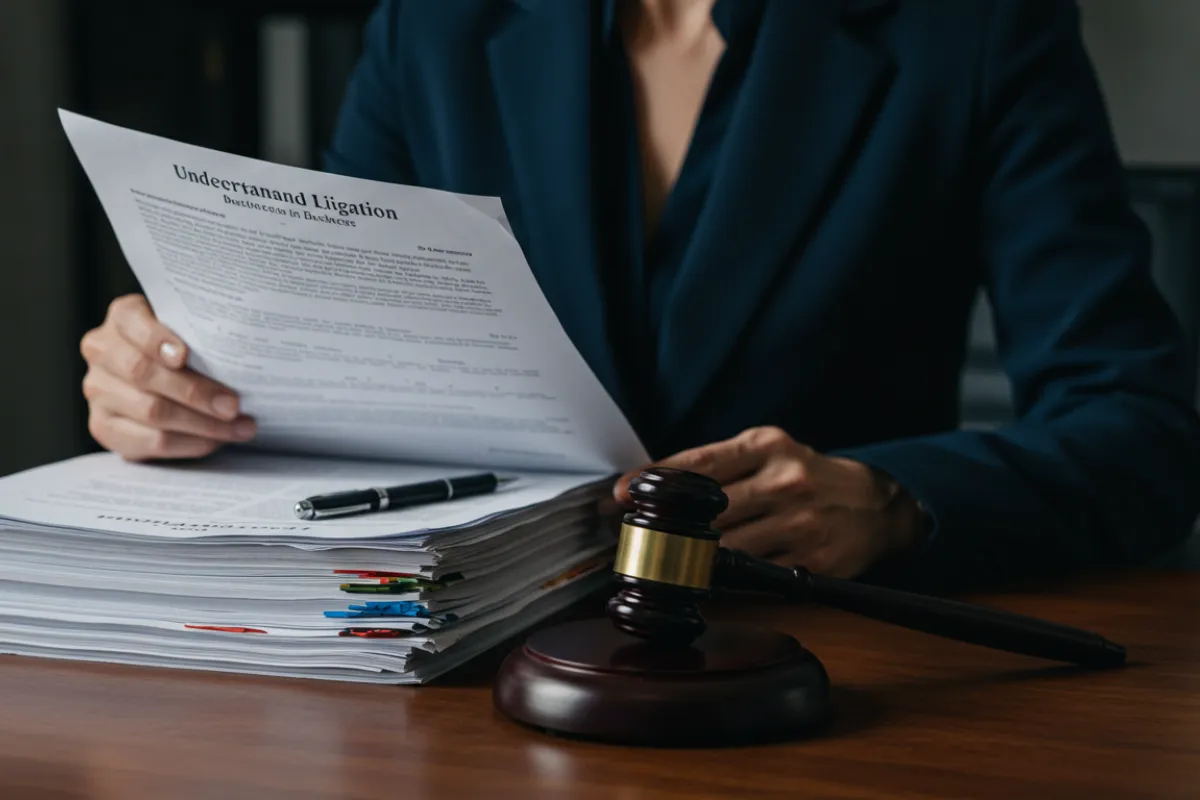Table of Contents
impact of litigation on business operations? Understanding Litigation in Business
What is Litigation?
Impact of litigation on business operations? Litigation is a legal process where disputes are resolved in court. Businesses can face lawsuits for several reasons. These include contract disputes, intellectual property issues, fraud claims, and non-compete cases.
Why is Litigation a Concern for Businesses?
Litigation can significantly impact business operations. It can lead to money problems, interrupt daily tasks, and damage a company’s reputation. Small businesses with limited resources are particularly vulnerable.
Common Types of Business Litigation

Contract Disputes
A breach of contract occurs when one party fails to fulfill contractual obligations. This can lead to financial losses and operational disruption.
Intellectual Property Disputes
Businesses rely on patents, trademarks, and copyrights to protect their innovations. When these rights are violated, disputes happen. This can cause financial strain and harm reputations.
Business Fraud Cases
False statements, misrepresentation, and omission of facts can lead to fraud claims. These cases can be costly and damaging to a business’s reputation.
Non-Compete Cases
When employees violate non-compete agreements, legal disputes may arise. These cases often involve sensitive business information, making them crucial to resolve quickly.
Breach of Fiduciary Duty
Business partners or executives must act in the company’s best interest. If they fail, lawsuits may follow, leading to financial losses and stakeholder distrust.
Insurance Coverage Disputes
Disagreements over policy claims can escalate into legal battles. Businesses need to understand their coverage to avoid litigation.
The Impact of Litigation on Business Operations
Financial Strain
- Attorney Fees & Court Costs: Legal, court, and expert witness fees quickly increase.
- Settlements & Judgments: Businesses may have to pay large settlements, affecting cash flow.
Operational Disruptions
- Resource Allocation: Key staff focus on legal prep. This takes time away from growing the business.
- Business Restrictions: Some lawsuits may impose temporary restrictions on business activities.
Reputational Damage
- Public Perception: Negative publicity can lead to a loss of customer trust.
- Competitive Risks: Competitors may take advantage of a company’s legal troubles.
Employee Morale & Business Relationships
- Workplace Stress: Employees may feel uncertain about job security.
- Client & Supplier Trust: Legal disputes can weaken business partnerships.
Long-Term Consequences of Litigation

Loss of Business Opportunities
A company involved in a lawsuit might find it challenging to win new business deals or grow its operations. Partners and investors might think twice about collaborating with a company with legal problems.
Reduced Creditworthiness
Lenders might consider a company involved in litigation risky, which can make it difficult to obtain loans or credit lines.
Delayed Growth Plans
Litigation can use up resources, which could be spent on growth, new ideas, and hiring more staff.
How to Avoid Litigation
Strengthening Contracts
- Use clear, detailed contracts to define terms and prevent misunderstandings.
- Work with a business litigation attorney to draft strong agreements.
Alternative Dispute Resolution (ADR)
- Mediation and arbitration provide faster, cost-effective solutions compared to traditional litigation.
Risk Management Strategies
- Regularly review policies and compliance procedures to identify potential legal risks.
- Maintain thorough documentation of contracts and transactions.
Business Insurance Protection
- Ensure your business has adequate liability insurance to cover legal disputes.
- Review policies regularly to understand coverage and avoid claim denials.
Seeking Early Legal Consultation
- Consult an experienced business lawyer at the first sign of a dispute.
- Proactive legal action can prevent a minor issue from escalating into costly litigation.
Steps to Take When Facing Litigation
Gather and Preserve Evidence
Document all relevant emails, contracts, and financial records that can be used in your defense.
Work closely with Legal Counsel.
Get a skilled lawyer to help you with the litigation process and consider settlement options.
Communicate with Stakeholders
Keep employees, clients, and investors informed to minimize speculation and relationship damage.
Assess Financial Readiness
Check the business finances. This will help confirm the company can manage legal costs without major issues. Click Here For More Information About Business
The Role of Legal Counsel in Litigation
Preventative Legal Strategies
A skilled business lawyer can create solid policies and contracts. This helps stop disputes before they start.
Representation During Legal Proceedings
A legal expert will handle your business’s court appearances, negotiations, and filings.
Advising on Settlement vs. Trial
Legal experts can assess the best steps to reduce financial loss and protect reputation.
Also Read: What is Good Business Stewardship? Corporate & Ethical Guide
Final Thoughts
Litigation can harm small businesses. It may cause reputational damage, disrupt operations, and create financial strain. If your business faces legal disputes, consult an expert attorney to protect your interests.




